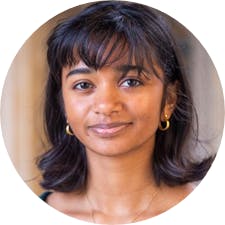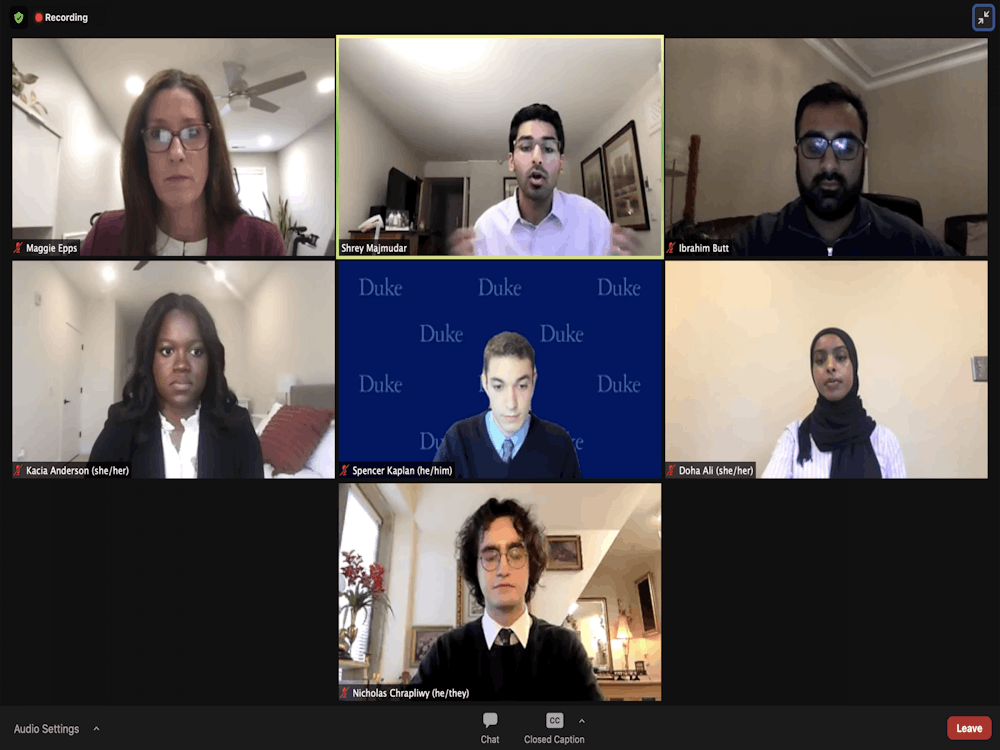On Thursday evening, undergraduates heard from current young trustees about the position and from finalists for undergraduate young trustee on why they’re applying for the position.
Each of the finalists spoke about their Duke journeys and added context to their application. Students who watch the meeting or a recording can fill out a feedback form to contribute to the young trustee selection process.
Senior Doha Ali described her family’s immigration story and its impact on her dedication to “the larger social fabric.”
“My parent’s immigrant story is similar to many others. It's filled with long hours and personal sacrifices and the nostalgia for what they left behind. But like many immigrants, they decided to invest in the promise of America by working hard and becoming civically engaged,” she said, adding that witnessing their “struggle and sacrifice and commitment to civic participation” helped her recognize her responsibility to the community.
Ali described her commitments to the University, including her experiences as an RA and member of the Prison Education Program.
“By listening and learning and doing, I have gained insight into many facets of Duke,” she said. “And these insights along with my parent’s early lessons to uphold my social responsibility are what inspired me to apply for young trustee this year.”
She noted that as a member of the board, she will have the opportunity to push the University forward and “do more.”
“That looks like digitizing the university and moving towards digitized learning. That looks like streamlining the universities businesses and that looks like engaging in transformative action,” she said.
Junior Kacia Anderson began by describing the lessons her single, immigrant mother instilled in her.
“Through my entire life, my mom has made countless sacrifices, although she wouldn't call them that. These sacrifices have allowed me to be where I am today,” she said. “What I think my mom wanted me to learn, and instilled in me successfully, is that there's sort of a mentality that is bigger than me. That I should be of service in any way that I can. It's important to not only put myself first, but to lift others as I reach my goals, because the two aren't mutually exclusive.”
Her educational trajectory, Anderson said, is both for herself and for her mom, her family and friends and mentors.
“It's such a privilege to be here amongst some of the most brilliant minds that I've encountered. And I've been continually able to learn about my peers, their experiences and where they go home,” she said, “However, being loyal to Duke does not mean that is without areas of improvement.”
Anderson described her various service experiences throughout her Duke career, including her volunteering with Duke-durham days, working as Rubenstein/LIFE mentor and serving on the Undergraduate Education Committee.
“For me, Duke has been an amazing opportunity, one that I know that not everyone has the privilege to be in access with. But I would like to make sure that Duke is accessible for all people in the future and its longevity as well.”
Senior Nicholas Chrapliwy began by describing the lessons of hard work and sacrifice he learned in childhood.
“I grew up the child of a single mother of four children who lost her job during the Great Recession, but never stopped working hard for her children, and always emphasized to us how important hard work and ambition is,” he said.
Chrapliwy’s passion for Duke’s history, he said, was spurred through the Bass Connections’ “Building Duke” program.
“[The program] was actually one of the catalysts for me and my really enduring curiosity and passion for understanding Duke, and how Duke is facing similar issues to other institutions of higher learning across the country, but also has its very unique problems,” he said, “As a young trustee, with that comprehensive knowledge of Dukes history, I know that I can offer the most comprehensively informed perspective on the issues facing now and in the future from a young person's perspective.”
He emphasized his experiences as a lifelong North Carolinian, as the founder of a youth service program, as a resident assistant and as a member of the task force are essential to the work of the Board.
“I'm always and always will be working to see this institution achieve its very best, and be a really courageous leader in the changing world,” Chrapliwy said.
Get The Chronicle straight to your inbox
Sign up for our weekly newsletter. Cancel at any time.
Senior Spencer Kaplan began by speaking about his involvement with Students for Housing Reform, a group that advocated for equitable housing, he said.
“I didn't get involved in the movement because I was angry at Greek life or because I thought it would somehow make my housing better,” he said. “I got involved because I recognize that it was a huge challenge for the University, and absent that sort of younger student perspective, they would lack a fuller understanding of the issues that students face.”
Throughout his Duke experience, Kaplan said he “tried to think boldly and strategically about a number of issues that [students] face on campus,” citing his experiences in American Grand Strategy and in getting faculty and administrators more interested in space.
Kaplan emphasized the rethinking necessary for the University in the current moment.
“The COVID pandemic has completely upended the way we think about education and housing on campus. AI and automation are forcing us to rethink what we think the workforce will look like in 20, 30 years and how universities can prepare students for it. And an increasingly polarized political environment poses increased challenges for universities as they face more and more scrutiny from senior leaders in the U.S,,” he said. “And what the Board of Trustees needs in its young trustee is someone who is a critical thinker and a strategic thinker.”
His diverse experiences, from various research labs to study abroad to serving on the hiring committee for the director of Jewish life, have prepared him for the role of young trustee, he said.
In the Q&A session moderated by junior Shrey Majmudar, chair of the YTNC, finalists responded to a variety of questions, ranging from their leadership styles to how they would approach difficult decision-making scenarios.
When asked what she would do should there be a contentious and polarizing upcoming board vote, Anderson stressed how accessible she would be to hear student opinions.
“If I were to be a trustee, I hope to be as accessible to where polarizing opinions can be brought to me. I think the role of the trustees to almost serve as a liaison between the student experience while not advocating for a certain particular group, being able to analyze what these different varying opinions are, and sorts out common themes and get more context,” she said.
Ali described her unique perspective as shaped by her multiple identities as a Black, Muslim woman. This, coupled with helping residents and other students, helps to inform her leadership style as a self-described “shadow leader.”
“Being able to deal with my own trials and tribulations and help other students overcome theirs has provided me with a unique perspective that I hope to bring onto the Board in terms of how do we take all the problems that we have on this campus, and think about what we need to create solutions that are dynamic,” she said.
In response to how Duke should continue to distinguish itself among peer institutions, Kaplan noted investing in interdisciplinary studies as paramount.
“We obviously invest a lot in this already. But one of the beautiful things about interdisciplinary studies is that you can use existing resources, but then just maximize their potential,” he said. “I think that it's often lost on us that there are very few schools in the country that have a tremendous medical school engineering, school, law school, policy school, business school. That positions us very uniquely, I think, to be a major player in interdisciplinary studies moving forward.”
Chrapliwy emphasized his identity as a lifelong southerner as key in his ability to converse with leadership.
“I think that my experience throughout high school and here at Duke, speaking with people in charge in the context of Southern cultural spaces, bringing challenges to them, it's something that, you know, because of the cultural atmosphere itself requires certain styles of communication,” he said. “I think having learned those, I can bring some of the very progressive, very challenging changes we want to see from Duke in a way that doesn't alienate any of the older board members, but rather gets them on the side of bringing ambitious, progressive changes to Duke University.”

Preetha Ramachandran is a Trinity senior and diversity, equity and inclusion coordinator for The Chronicle's 118th volume. She was previously senior editor for Volume 117.

